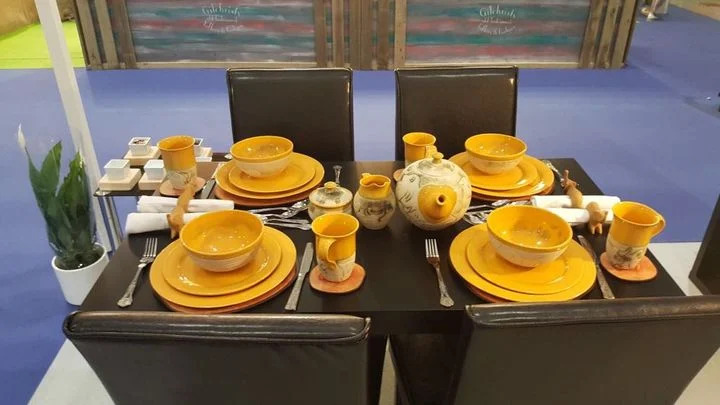By RYAN JARVIS
Anyone who has come across master potter and artist Meshack Masuku – or, as most people call him, Uncle Meshack – would have noticed that he wears a feather in his hat or hair.
Most people would assume that he has done this as a fashion statement. But it is because he is of royal descent – the feather is a symbol of royalty in Swaziland/eSwatini, and it works as a crown.
For Uncle Meshack, the key to ceramics is knowing one’s history and culture. Ceramics has been an integral part of South African life for thousands of years. Clay has been moulded to create functional items, like posts and water jugs, but also as a form of artistic expression.
In a world of global supply chains, originality and creativity have been forced to take a back seat.
However, people like Meshack value beauty and hard work. He started his ceramics journey when he was 18. It was one of the first skills he had ever learned, which became his source of income and inspiration.
His ceramics business started in Makanda but later moved to Kenton-on-Sea, where the market was more receptive to his efforts.
The Makana district boasts the largest deposit of kaolin in South Africa. Kaolin is used to make clay for tiles, porcelain and pottery items. Sadly, no kaolin is currently processed in our district, and Meshack’s is one of the few enterprises creating manufacturing products from it.
He has crafted a life from the skills he has mastered, and he is passing his skillset and mindset on to a new generation. He has laid claim to the title of teacher and passes on his skills to any young person willing to work hard to make a life for themselves.
He has trained over 200 people in the art of ceramics and is now in the process of facilitating other skills, such as compost making, woodwork, and “any other craft that can be done by hand”.
He works on a paying-it-forward strategy – he teaches people the skills for free, and then they will continue his legacy by teaching others.
However, once the student has made a sale, they will share the profits from the works. This helps to fund his life, the student’s life, and fuel the creation of ceramics.
Meshack has a franchise of different types of businesses that were born from his teachings. He rarely makes things nowadays; instead, he teaches and facilitates the students at his ceramics workshop in Kenton.
His students run all of his businesses, except for his workshop.
His philosophy is to enjoy it and to follow your heart – not the money. “Why be the richest man in the grave?” he asks.
He teaches skills because you can lose money, but you can never lose a skill. Anyone wanting to learn or teach a skill need only contact Meshack, as he has a big heart and an even bigger love for teaching.
Visit Lusiba Ceramics just outside Kenton-on-Sea, at the entrance of River Roost B&B. Email: meshacklmasuku@gmail.com Phone: 073 5961341
About the journalist
I am Ryan Jarvis, a third-year writing and editing student at Rhodes University. I love to write because it gives me the freedom to be myself. I have a passion for soccer but an even stronger passion for South Africa, and I hope that my passion can help our beautiful country one day. I hope that my writing will someday bring joy and knowledge to all the people of South Africa – both privileged and underprivileged.


